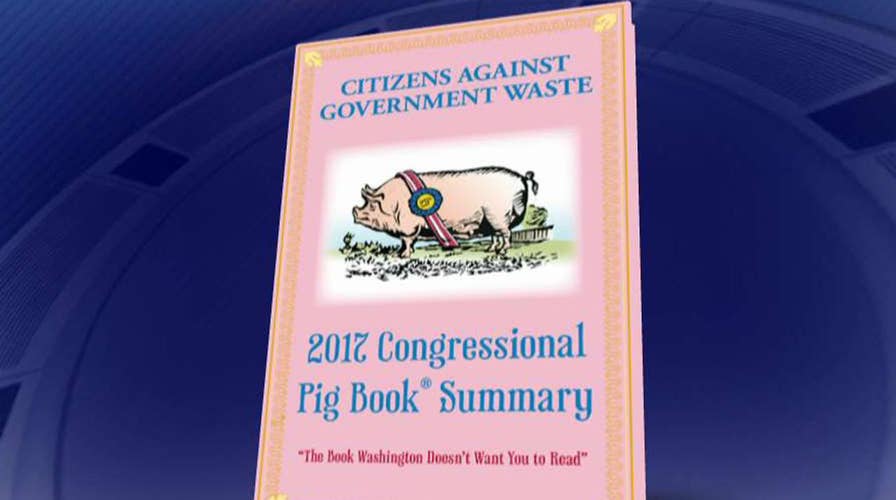2017 congressional 'Pig Book' exposes nearly $7B in earmarks
Citizens Against Government Waste President Thomas Schatz details pork barrel spending on 'America's Newsroom'
Pork-barrel spending is surging despite a roughly five-year-old moratorium on so-called earmarks, according to the annual "Pig Book" report released Wednesday.
The report calls out special projects that receive billions of dollars thanks to Capitol Hill lawmakers who tuck the funding -- which critics call "pork" -- into appropriations bills.
The latest report calls out projects ranging from the often criticized F-35 Joint Strike Fighter to the East-West Center in Hawaii. The latter originally was proposed decades ago as a way to promote better relations with Pacific nations and was slated to get nearly $6 million despite long-standing opposition from the State Department, according to the report.
“We all need to work on wasteful spending,” Iowa Republican Sen. Joni Ernst said at the Capitol Hill event announcing the release of the report by watchdog group Citizens Against Government Waste. “We know Washington has some big-time spenders.”
The senator pointed to a recent inspector general's report that concluded the Defense Department overspent as much as $29 million for uniforms for the Afghan National Army, which had a forest camouflage pattern despite much of the country having a desert landscape.
Ernst said the total cost of the uniforms was $93 million and called them “overpriced and under-vetted” as well as “useless.”
The 15-page Pig Book shows the number of appropriations earmarks increased from fiscal 2016 to 2017 -- as well as the cost, from $5.1 billion to $6.8 billion.
The report acknowledged the recent totals are lower than during the earmark heyday -- fiscal 2006, when a record $29 billion was inserted to appropriations bills.
However, it also pointed out that totals have steadily increased since the $3.3 billion recorded in 2012, the first year after Congress agreed to an earmark moratorium.
“We’re no longer finding indoor rain forests or teapot museums, but there are some concerning findings,” group President Thomas Schatz said.
Among them in fiscal 2017 was $10.3 million to support 49 National Heritage Areas under the National Park Service.
Earmarks can be inserted into a bill to help win the support of a member of Congress. Or they could be inserted by a member trying to quietly steer millions to a home-state project -- like the ill-fated, roughly $238 million “Bridge to Nowhere” in Alaska, which was intended to link the mainland to an island that contained an international airport and just 50 residents.
The release of the book also comes amid uncertainty inside the GOP-led House about whether the chamber will continue the ban, as the Republican-led Senate recently did.
A group of House Republicans including Reps. John Culberson of Texas, Mike Rogers of Alabama and Tom Rooney of Florida tried days after President Trump’s “Drain the Swamp” presidential win to “modify” the moratorium, according the report.
“We’ve got to keep the ban in place,” Arizona GOP Sen. Jeff Flake said Wednesday. “We’d like to see a permanent ban. … We owe it to the taxpayers.”
Retired Oklahoma Sen. Tom Coburn, a Pig Book champion, once called earmarks “the gateway drug to Washington’s spending addiction.”
Congressional lawmakers also attending the event Wednesday included Reps. Mark Walker of North Carolina and Jim Banks of Indiana.





